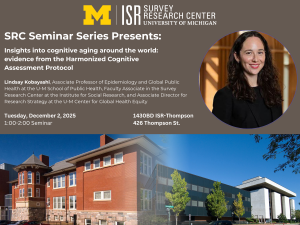Presented By: Survey Research Center
SRC Seminar Series Presents: Insights into cognitive aging around the world: evidence from the Harmonized Cognitive Assessment Protocol
Lindsay Kobayashi, Associate Professor of Epidemiology and Global Public Health at the U-M School of Public Health

Abstract:
Although nearly 75% of global Alzheimer’s disease and related dementias (ADRD)cases will occur in low- and middle-income countries by 2050, little ADRD research includes data from these regions. The Harmonized Cognitive Assessment Protocol (HCAP) is a major innovation that provides, for the first time, harmonized data for cross-national comparisons of later-life cognitive functions that are sensitive to linguistic, cultural, and educational differences across countries. The HCAP was first developed by the US Health and Retirement Study (HRS) team in partnership with its global network and has now been implemented in over 20 countries around the world. However, cognitive function does not lend itself to direct comparison across diverse populations without careful consideration of the best practices for such comparisons. This seminar will present the process of a culturally sensitive statistical methodology to harmonize HCAP data around the world, theoretical and methodological considerations for high-quality comparative analyses of cognitive aging around the world, and insights gained from such analyses to-date.
Biography:
Lindsay Kobayashi is an Associate Professor of Epidemiology and Global Public Health at the U-M School of Public Health, Faculty Associate in the Survey Research Center at the Institute for Social Research, and Associate Director for Research Strategy at the U-M Center for Global Health Equity. Her research is on the social epidemiology of cognitive aging from a global perspective, investigating how social and economic factors throughout the life course influence cognitive health in older adults around the world. She is a Co-Investigator of the Health and Retirement Study and the Co-Director of the HCAP Network.
Although nearly 75% of global Alzheimer’s disease and related dementias (ADRD)cases will occur in low- and middle-income countries by 2050, little ADRD research includes data from these regions. The Harmonized Cognitive Assessment Protocol (HCAP) is a major innovation that provides, for the first time, harmonized data for cross-national comparisons of later-life cognitive functions that are sensitive to linguistic, cultural, and educational differences across countries. The HCAP was first developed by the US Health and Retirement Study (HRS) team in partnership with its global network and has now been implemented in over 20 countries around the world. However, cognitive function does not lend itself to direct comparison across diverse populations without careful consideration of the best practices for such comparisons. This seminar will present the process of a culturally sensitive statistical methodology to harmonize HCAP data around the world, theoretical and methodological considerations for high-quality comparative analyses of cognitive aging around the world, and insights gained from such analyses to-date.
Biography:
Lindsay Kobayashi is an Associate Professor of Epidemiology and Global Public Health at the U-M School of Public Health, Faculty Associate in the Survey Research Center at the Institute for Social Research, and Associate Director for Research Strategy at the U-M Center for Global Health Equity. Her research is on the social epidemiology of cognitive aging from a global perspective, investigating how social and economic factors throughout the life course influence cognitive health in older adults around the world. She is a Co-Investigator of the Health and Retirement Study and the Co-Director of the HCAP Network.
